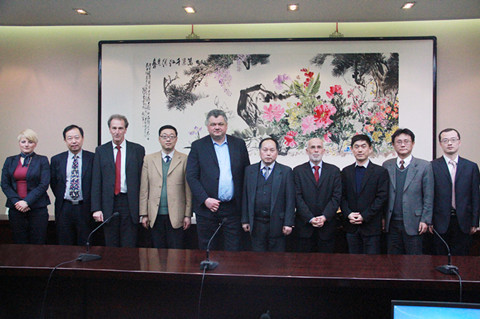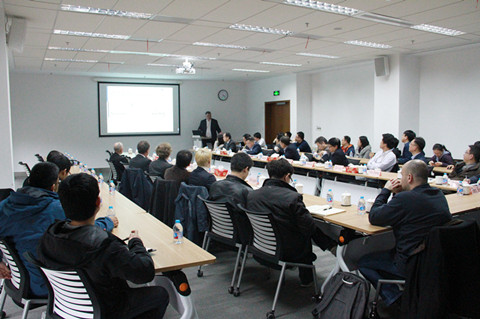Shanghai Institute of Microsystem and Information Technology Joint Hands with Forschungszentrum Jülich GmbH to Promote the Construction of Sino-Germany Virtual Joint Research Institute of Functional Materials and Electronics
Date:08-06-2017 | 【Print】 【close】
From Feb 22 to 23, the "Sino-Germany Virtual Joint Research Institute of Functional Materials and Electronics" co-constructed by Shanghai Institute of Microsystem and Information Technology and Forschungszentrum Jülich GmbH held 2017 Annual Council in Shanghai, to systematically discuss the cooperation work progress over the past year since the establishment of the Joint Research Institute and promote the in-depth cooperation in the future. Prof. Sebastian Schmidt, Director of Forschungszentrum Jülich GmbH, Prof. Andreas Offenhaüsser, Director of Peter-Grunberg Institute 8 (PGI-8) of Forschungszentrum Jülich GmbH, Researcher Yu Yuehui, Deputy Party Secretary and Researcher Xie Xiaoming, Deputy Director of Shanghai Institute of Microsystem and Information Technology (SIMIT) attended the meeting.
Helmholtz Association is Germany's largest national research team with 18 national research centers (national laboratories). In October 2015, SIMIT signed a framework agreement with its affiliated Forschungszentrum Jülich GmbH for the co-construction of “Sino-Germany Virtual Joint Research Institute of Functional Materials and Electronics”, which identified four aspects of research topics, and planned to promote the bilateral cooperation in multiple levels and fields through scholar exchange visits, student exchanges and sharing of scientific research facilities, etc., to lay a foundation for the scientific and technological exchanges in energy, health and other aspects. Prof. Sebastian Schmidt and Prof. Andreas Offenhaüsser were engaged as honorary professors of SIMIT.
On the council, Prof. Andreas Offenhaüsser and Researcher Xie Xiaoming systematically reviewed the work progress over the past year since the establishment of the Joint Research Institute on behalf of the respective parties. Both parties agreed that, after more than a year of work, Chinese and German research team has made some achievements in exchange visits, joint publishing of papers, training of graduate students and the other aspects. And both parties shall promote more in-depth cooperation on the existing basis through joint application for international cooperation projects, etc., to enhance the influence of scientific research findings and international cooperation. Both parties also conducted in-depth discussions on issues in the cooperation work, development plans, academic committee construction and final assessment, etc.
Prior to the convening of the council, both parties also conducted technical seminars on four areas of cooperation in superconducting electronics, bioelectronics, quantum materials and photovoltaic technology. Prof. Andreas Offenhaüsser, Prof. DetlevGrutzmacher, Director of Peter-Grunberg Institute 9 (PGI-9), Dr. Hans-Joachim Krause of PGI-8 and Researcher Liu Zhengxin, Director of New Energy Technology Research Center of Shanghai Institute of Microsystem and Information Technology introduced the research progress and future work plan of the cooperative projects respectively.
During the meeting, at the invitation of Researcher Jiang Mianheng, President of ShanghaiTech University, Prof. Sebastian Schmidt led a delegation to visit ShanghaiTech University and gave an invited report, introducing the development history of Helmholtz-Gemeinschaft, sharing the experience in the construction of German national laboratory, etc., and making valuable suggestions on the construction of science technology innovation center with global influence in Shanghai. Academician Wang Xi, General Director of Shanghai Institute of Microsystem and Information Technology, presided over the seminar. Ma Xingfa, Deputy Director of Science and Technology Commission of Shanghai Municipality, Zhu Zhiyuan, Director of Chinese Academy of Sciences Shanghai Branch, Gong Jinkang, Vice President of ShanghaiTech University and others attended the seminar.

